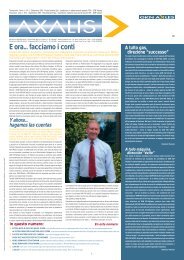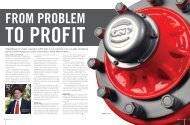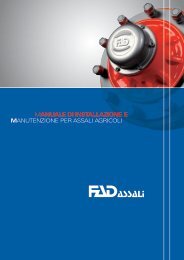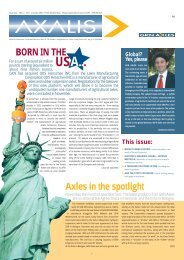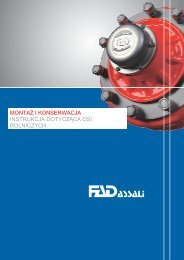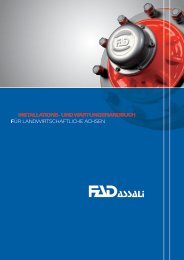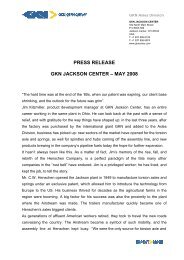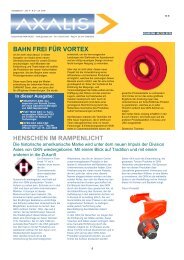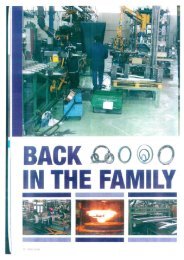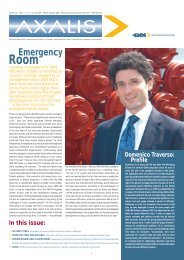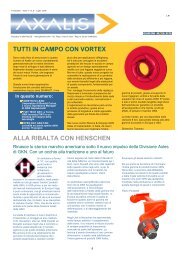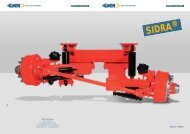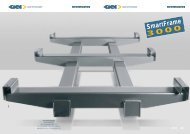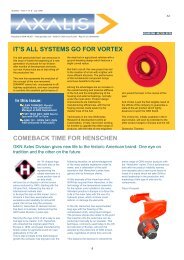Guarantees don't better than these... - FAD assali
Guarantees don't better than these... - FAD assali
Guarantees don't better than these... - FAD assali
Create successful ePaper yourself
Turn your PDF publications into a flip-book with our unique Google optimized e-Paper software.
Quarterly - Year 2 - N°4 - July 2006 - Poste Italiane Spa - Postal subscription service 70% - DCB Varese<br />
Ad<br />
Periodical of GKN AXLES - Carpenedolo (BS) V.le S. Maria 76 - Tel. 030.99861 - www.gknaxles.com - Editor in Chief Cinzia Furiani - Reg. no. 53 (15/09/2005)<br />
Produced by: SS&C/Studio Editoriale FattiDiParole - Creative: SS&C<br />
This issue:<br />
LEAN ENTERPRISE: Enterprise it is, but it has nothing<br />
to do with space flight. Lean Enterprise means a new way<br />
of thinking about business. Massimo Limonta tells us why.<br />
FORS AND GKN AXLES: the success of this<br />
partnership, explained by a truly expert procurement operator.<br />
CRACKS: engineers devise tests to beat cracks.<br />
SIDRA steals the limelight at the 34th edition of Fima,<br />
Saragossa (honourable mention).<br />
Full marks<br />
for everyone<br />
Usually, when somebody starts talking<br />
about “reorganising” companies, the<br />
impression we have is that there’s bad<br />
news just round the corner. It’s a polite<br />
way of saying “cuts”, or “downsizing”.<br />
That may be the case for many, but not<br />
for us at GKN Axles. Our decision to<br />
reorganise (which the changed corporate<br />
philosophy makes quite clear) comes<br />
out of a desire to develop and extend<br />
business dealings so that objectives and feasible aims can be<br />
fulfilled to as great an extent as possible. We have already<br />
made progress in cutting back on waste and delays and have<br />
cut back on the red tape, but it’s an ongoing process. Our<br />
exclusive aim is to improve the quality of labour and therefore<br />
also of productivity, which can only benefit career advancement<br />
(a necessary part of personal progress) among our staff<br />
members. Everyone (or nearly everyone) has understood this,<br />
including those who were (understandably) sceptical or<br />
diffident at first when faced with changes which forced new<br />
habits onto them and new approaches to their work. Now that<br />
all employees have adjusted to the changes, they have become<br />
a vital part of change for the future. The five new teams<br />
including production staff, technical staff, marketing staff,<br />
white-collar workers and managers, all work on the same<br />
plan. They have already put down roots. Their members are,<br />
professionally speaking, ideally equipped for the tasks at<br />
hand. They are open to innovation. Everyone (or nearly<br />
everyone) has come round to this new culture of improvement<br />
and of evolution of the whole through the efforts of the individual.<br />
So we can turn to eliminating waste, time losses, minutes<br />
wasted, and disorganisation. Thank you all!<br />
Domenico Traverso<br />
Watching him on a football pitch, as intense today as when<br />
he used to dream of playing for Doncaster Rovers, it’s<br />
difficult to imagine him sitting behind an executive desk.<br />
“Football is still my great passion”, explains Tony Lindsay,<br />
Managing Director of the Wheel unit of GKN <strong>FAD</strong>, “and<br />
<strong>Guarantees</strong><br />
don’t <strong>better</strong><br />
<strong>than</strong><br />
<strong>these</strong>...<br />
Five-year guarantees are a very special feature of the new<br />
series of axles which GKN AXLES has finally completed<br />
development of, as part of its efforts to provide customers<br />
with the very best products. This is the promise that is<br />
implicit in the name of this product range. State-of-the-art<br />
technology and meticulous care over details are very much a<br />
part of the work done at the company premises at<br />
Carpenedolo, now an important part of the British giant, GKN<br />
For Tony Lindsay, Managing Director of the Wheel unit of GKN <strong>FAD</strong>,<br />
teamwork is everything. Playing football as a kid, he learned that all the<br />
players have to help one another out, give it their all, show that they want to<br />
win. He has transposed this same mentality to the world of work, because a<br />
company is a bit like a football team, and to win you have to believe.<br />
Everyone.<br />
whenever I can I get out there, despite my 53 years and a<br />
ligament in my knee that said ‘OK no more football’. The<br />
injury happened in Carpenedolo, during a match with the<br />
GKN <strong>FAD</strong> team”.<br />
(Continues on page 5)<br />
PLC. Its products will be most useful for very fast vehicles<br />
requiring performance specifications which would otherwise<br />
be unthinkable. The heretofore unprecedented duration of<br />
the guarantee is the company’s way of taking on responsibility<br />
for its claims of super-efficiency. Axles are usually guaranteed<br />
for 24 months at the most.<br />
According to Domenico Traverso, the managing director GKN<br />
AXLES, «More and more people are showing considerable<br />
interest, above all in view of the durability of the axles. This<br />
was bound to be the case, given the market the products<br />
target and their use. The Gold series is no more <strong>than</strong> a<br />
concentrate of the best we know how to do. We assembled<br />
it with great care and believe our customers will be totally<br />
satisfied».<br />
We foresee a glorious future for our Gold products, with<br />
many outsiders taking an interest in them. The care we take<br />
over <strong>these</strong> products will inevitably lead the manufacturers of<br />
agricultural vehicles toward our door. “Distinguishing features?”<br />
One thing is the tubular beam, lowering overall structural<br />
weight considerably. The hubs are provided with Timken<br />
bearings (head and shoulders above the standard, qualitywise).<br />
It was decided to use high-speed bearings. This fits in<br />
with the ongoing trend in vehicle design for lighter, fast,<br />
user-friendly machines with high (and increasing) load and<br />
durability performance capacities. The hubcaps are<br />
screw-mounted, not applied by pressing. This enables <strong>better</strong><br />
axle maintenance while allowing for the integrity of each<br />
part. These features, again, enable higher performance<br />
ratings and durability. A further feature reflects our response<br />
to an increasingly evident customer need. Each axle is set up<br />
for assembly of the toothed wheel. This enables both use of<br />
antilock braking systems (ABS) and application, in specific<br />
circumstances, of special trailer-speed sensors. Our desire<br />
to upgrade our products also shows in the look zinc-plated<br />
hubcaps, capped greasenipples, and black (instead of the<br />
traditional red) painting. Yet another reason to choose Gold<br />
axles, now the star item in the GKN Axles brochure and<br />
already a groundbreaking chapter in the history of<br />
Carpenedolo.<br />
Laura de Laurentiis<br />
Peter Pan in the guise<br />
of theTERMINATOR<br />
1<br />
BACK TO BEGINNING
New roles<br />
Efficiency first<br />
He doesn’t know how to close a deal, mount an axle, or handle an<br />
order, and yet he’s changing the entire organisational structure of GKN Axles. Massimo Limonta, the<br />
lean manager at Carpenedolo, has a job that is as simple to define as it is demanding to put into practice:<br />
optimising work flows throughout the company, and cutting back on waste and unnecessary costs.<br />
Introduction of lean production in an area in which 10-30<br />
operators work enables:<br />
- increased productivity (by 20-60%);<br />
- reduced work in progress (by 30-70%);<br />
- reduced defects (by 20-40%);<br />
- reduced set-up times (by 50-80%).<br />
(Source: Galgano Group)<br />
«Finding out where inefficiency lies and getting rid of all that<br />
doesn’t add value to our products. That’s what “Lean<br />
Enterprise” means, put as simply as possible». This definition,<br />
provided by Massimo Limonta, the Site Continuous<br />
Improvement Leader at GKN Axles since November 2005,<br />
leaves us with the impression that his job can’t be as<br />
complicated as all that... that is, if revolutions aren’t<br />
complicated enough in themselves! Because that’s what<br />
he’s doing, revolutionising the Brescia company from top to<br />
bottom. Which, for him, sometimes means leaving the office<br />
very late in the evening. Lean Production is one of the most<br />
valid organisational models generated by the industrial<br />
sector. It is a model which can radically transform the way in<br />
which corporate commodities and assets are designed,<br />
manufactured and marketed. It’s a Japanese invention. It<br />
first saw the light at the Toyota plants when one of the<br />
vice-chairmen, Taiichi Ohno, developed this approach within<br />
the context of the Global Production System. The techniques<br />
underpinning Lean Production, however, don’t apply exclusively<br />
to giant corporations. All working structures can adopt them<br />
for organisational improvement, to upgrade both efficiency<br />
and market competitiveness.<br />
«“Lean” thinking is not just for the manufacturing department.<br />
If this method is to be successful, with concrete results, the<br />
entire company, all members and fields of activity, must<br />
become involved and must make this new culture their own.<br />
This is why, for GKN Axles, the more appropriate term is Lean<br />
Enterprise. First we must hunt down waste and then get rid<br />
of it. Constantly upgrading all activities and optimising<br />
resources are not concepts reserved for production alone.<br />
They must, instead, be gradually applied throughout the<br />
company».<br />
Limonta is the manager who must be contacted for all<br />
production organisation decisions. His task is rather a<br />
strange one. He doesn’t lead a team. No one has to report to<br />
him on what they’re up to, and yet all organisational<br />
decisions have to be reached in agreement with him. «I like<br />
to see myself as a facilitator who, from time to time, will<br />
collaborate with expert staff from various areas of activity. I<br />
don’t have their specific skills or experience.<br />
My task differs from theirs. Since I am in a position to<br />
monitor the entire company, I can see how processes can<br />
be improved, whether it’s production or exchanges of<br />
information on a customer or a job delivery... and, when<br />
appropriate, I step in to get rid of everything that leads to<br />
wasted time and money».<br />
Meetings<br />
Lean is<br />
BEAUTIFUL<br />
About a year after the initial concepts of lean production were<br />
introduced at GKN Axles, we already see the first results.<br />
Now, the entire company is involved in continuous improvement<br />
and everyone as come to understand how this revolution<br />
can transform the work of each of us. For the <strong>better</strong>.<br />
According to various researchers, only 24% of waste in a<br />
manufacturing company derives from production. The remaining<br />
76% derives from all the other corporate areas of activity taking<br />
place alongside production as such. With this concept in mind,<br />
the top management team at GKN Axles decided to take a<br />
second look at the entire structure from the organisational point<br />
of view. Lean Production concepts emerged at Carpenedolo for<br />
the first time last year. Acting on the basis of the work of a number<br />
of external consultants, an in-house event dedicated to<br />
Kaizen (continuing improvement of activities) was organised.<br />
The first results were noted immediately. However, for further<br />
progress to be made, the top management team at GKN Axles<br />
saw that it had to have an operator to whom it could turn with<br />
respect to all functions. Needs went beyond what external<br />
consultants could offer. This is where Massimo Limonta comes<br />
into the picture. It also clearly indicates just how seriously the<br />
top management team GKN Axles believes in the advantages of<br />
having a staff member dedicated to company-wide improvements.<br />
Having established <strong>these</strong> priorities, a course was arranged on<br />
lean enterprise according to the programme drawn up by GKN.<br />
The meetings took place last February and were attended by 25<br />
lean managers from all over the world, as well as operators at<br />
the Carpenedolo plant. Massimo Limonta, however, is merely the<br />
tip of the iceberg. We are witnessing a “revolution” which has<br />
changed the thinking at GKN Axles from the bottom up. There is<br />
little sense in talking of lean enterprise if the culture is not absorbed<br />
by all staff, with no exceptions. Everyone must have a firm grasp<br />
of the basics. This is what we ask of all, whatever their role<br />
within the company, because even what are apparently the<br />
simplest operations can generate errors and, therefore, waste<br />
(resources, materials, money). So it turns out that even the<br />
simplest and most commonplace operation can be improved on<br />
the next time it is performed.Lean managers therefore become<br />
coordinators of the various activities. But it is more appropriate<br />
to think of them as experts capable of collecting and redistributing<br />
information and organisational models that completely eliminate<br />
waste (including time). Massimo Limonta has been at work just<br />
for a few months. The idea is to turn the plant in Lombardy<br />
“inside out, like a glove”. By the looks of what he has already<br />
done, the prospects are encouraging for the future.<br />
Thinking lean means...<br />
- Pinpointing what is of value to customers;<br />
- Focusing on the sequences of value-generating<br />
activities;<br />
- Ensuring constant, uninterrupted flows;<br />
- Designing and manufacturing only what customers<br />
want, when they want it;<br />
- Making sure that when a task is done it will be done<br />
<strong>better</strong> the next time round (i.e. continuous improvement).<br />
(Source: Centro Studi e Ricerche Gecos)<br />
2<br />
BACK TO BEGINNING
Interview with...<br />
A procurement manager<br />
who minds our own business<br />
As Fors MW started up in 1991, when one of the owners, Leif Fors, now general manager, decided to open a plant in Tallinn, Estonia, to<br />
produce agricultural machinery. In this part of Europe, called the “wild east” after the fall of the Berlin wall, people starting talking about<br />
a market economy for the first time, and the opportunities for enlightened entrepreneurs certainly aren’t lacking. Neither are the problems.<br />
In 1992, the first fully Fors project, a notably bulky trailer, left the factory gates in Tallinn. Since then the company has seen constant growth.<br />
In 1997 it opened its new plant (more <strong>than</strong> 11,000 sq. m.) in the suburbs of Tallin, at Saue. With the new capital injection came a Swedish<br />
senior management team. This was the quality leap required for the company to tackle new markets and come out with new products<br />
while continuing to target, above all, small and medium size enterprises. Fors now has industrial premises covering 35,000 sq. m. in Tallin,<br />
and a staff of 125, plus 10 others on the marketing and after market side, travelling around the world. In Europe alone, there are about 350<br />
Fors MW product retailers. Let’s talk about relations with GKN Axles with Odile Mombelli, purchasing department manager.<br />
Which are Fors MW’s main markets? What kind of customers<br />
do you deal with?<br />
Our activities are mainly concentrated in the Scandinavian<br />
area, but Germany, France and Great Britain are rapidly<br />
becoming more important for growth of the company’s turnover.<br />
Our customers are mainly small and medium size industrial<br />
concerns in the sectors of farming, forestry, and excavators<br />
etc. who are looking for a good quality-price ratio.<br />
When did commercial relations with GKN Axles start up?<br />
Fors MW decided to purchase its first GKN Axles products in<br />
2004. Collaboration with the Carpenedolo company has been<br />
ongoing since that time, in the form of yearly contracts.<br />
What made you opt for GKN?<br />
At first it was purely technical, but we soon saw that our trust<br />
in those with whom we had dealings was well placed, professionally<br />
speaking. High quality, keeping to delivery schedules<br />
and excellent commercial relations led to closer and closer<br />
contacts between our companies soon after our first contact.<br />
What kind of partnership have you established with GKN Axles?<br />
Above all, technical. We began to study and develop solutions<br />
together with GKN Axles, and the exchange of information<br />
between the technical offices of each company has shown<br />
itself to be fundamental, for example, during the braking<br />
system calculation and regulatory stages for our machinery.<br />
What components does GKN Axles supply Fors with?<br />
All our production uses axles manufactured at Carpenedolo.<br />
Our orders also include suspension systems. The wheels are<br />
GKN, but procurement is by other distribution channels.<br />
Interview with...<br />
An engineer<br />
in Italy,<br />
on a journey of<br />
discovery<br />
He left the beaches of California and came to Carpenedolo to<br />
learn everything he could about materials, and for a massive<br />
dose of experience. Konstantinos Boukouris is ethnically<br />
Greek but very American, having been born, raised and educated<br />
in the US. He will be at GKN Axles in Carpenedolo for<br />
six months. Dividing his time up between the occasional<br />
budget meeting and trips to Lake Garda, Boukouris is<br />
preparing himself for a career as one of the top managers of<br />
tomorrow.<br />
With a name like Konstantinos Boukouris there can be no<br />
doubt as to his Greek origins. But Boukouris (24) is a normal,<br />
regular Californian guy. He loves sport (especially swimming<br />
and beach volleyball). He also loves books and travelling, and<br />
displays considerable curiosity when he encounters foreign<br />
languages and cultures. He took a degree in mechanical<br />
engineering at Michigan University. His first career steps<br />
were at General Motors, followed by GKN. He worked first for<br />
the British multinational in research and development (for<br />
GKN Driveline) and went on to production organisation (in<br />
particular, lean manufacturing and continuing improvement)<br />
for the Aerospace division. He came to Carpenedolo in<br />
February for his first real mission abroad.<br />
What are your tasks and what is the main reason for your<br />
transfer to the Italian GKN Axles branch?<br />
Technically speaking, I am a “material supply manager”. I<br />
work on the various problems relating to procurement of<br />
materials and the processing of <strong>these</strong> materials.<br />
You will be a member of the staff at GKN Axles in<br />
Carpenedolo for six months in accordance with the terms<br />
and conditions of the foreign training programme set up by<br />
the company for its employees. What is the goal that<br />
management set for you?<br />
My Italian “mission” was spelt out very clearly. I cover a new<br />
position in a company in which I come face to face on a daily<br />
basis with a language, culture and business methods which<br />
differ from my own. I must translate everything I see and<br />
which I come into contact with as part of my professional<br />
advancement and progress on a personal level.<br />
Can you tell us how you reckon things are going at this early<br />
stage, here in Italy?<br />
Professionally, I’m very satisfied indeed and very pleased that I<br />
accepted the proposal GKN made. I’ve had an opportunity to<br />
take up a new position with greater responsibilities and reach a<br />
turning point in my career. As soon as I got here, I worked hard<br />
and, above all, I had a chance to be in close day-to-day contact<br />
with the top managers here. I have been able to follow up<br />
projects which will greatly affect GKN Axles’ performance. The<br />
only negative thing about my stay in Italy is that it will come to<br />
an end all too soon!<br />
Are you this positive about your stay as far as things outside<br />
the factory are concerned?<br />
I found it easy to appreciate the Italian lifestyle. I’ve had the<br />
chance to see new places and meet great people who have<br />
been very kind, to enjoy your cuisine... Relaxing after work by<br />
going to Lake Garda has become something I enjoy regularly. I<br />
had no knowledge of Italy before this visit. As far as I was concerned,<br />
Europe meant Greece, especially where my relatives<br />
are. Now I can say I feel perfectly at home in Italy, apart from<br />
the language, of course.<br />
Is there an Italian mindset you see in the workplace too?<br />
The rhythm is less frantic <strong>than</strong> in the States. It’s not that people<br />
work less here. Quite the opposite. But it’s more relaxed.<br />
Domenico Traverso likes to say “foot on the gas” and this drives<br />
us to step up the rhythm, but the open-mindedness of Italians and<br />
their friendly approach also clearly shows in the workplace, and,<br />
the way I see it, this helps you work <strong>better</strong> and, I have to say, more<br />
willingly.<br />
What do you miss from back home in the United States?<br />
Obviously I miss family and friends, and the variety of food you find<br />
in America. From Chinese restaurants to Greek cafés and so on.<br />
Apart from that, I don’t miss much. I live in a place where in an hour<br />
I can be in the countryside or the city, where I can check out<br />
locations of artistic and cultural interest... Hardly a day need go by<br />
without finding out something new to see and learn about.<br />
3<br />
BACK TO BEGINNING
Research and Development<br />
A perfect marriage<br />
At the GKN <strong>FAD</strong> facility, the conditions that wheels and hubs<br />
encounter during use are recreated. The idea is to study reactions in detail. The results of the tests and<br />
trials enable analysis of the pros and cons of all solutions. Only in this manner can projects<br />
be brought forward without error.<br />
Cracks are a nightmare for engineers, who must calculate<br />
the loads and stress the components can take. The main<br />
cause of wheel breakage is cracks appearing on the disk<br />
(nearly always starting out from the fixing holes to finally<br />
cover the entire component).<br />
In most cases, cracks are generated by the disc bending<br />
while turning. This bending, itself, is caused by shifts in the<br />
disc’s position with respect to the tyre centre line and by the<br />
lateral forces transmitted to the tyre from the ground and<br />
curves. It is therefore vitally important that, during the design<br />
stage, we should be able to calculate where stress is<br />
greatest, and how great the loads involved are. This enables<br />
us to establish the lifespan of wheels.<br />
To study <strong>these</strong> developments we must recreate in the laboratory<br />
the physical conditions to be found in the field, so a trial<br />
unit was set up at the GKN <strong>FAD</strong> Research and Development<br />
facility with “fatigue” testing machinery that reproduces in<br />
the lab the stress the wheel undergoes during use. By increasing<br />
loads until cracks are generated we can study the<br />
distribution of forces acting on the disc and the loads which<br />
each piece, according to its form, is capable of supporting.<br />
A fundamental aspect conditioning the life of wheels is the<br />
coupling with the hub. All stress is channelled through this<br />
interface zone, and the influence of hub type on the wheel is<br />
extremely important.<br />
The critical factor is hub shape, above all at a time in which<br />
the trend is toward lighter components, with less use of<br />
materials and therefore lower prices (the so called starshaped<br />
hubs).<br />
To meet their needs in this regard, many constructors opt for<br />
undercuts on the support flange, as an alternative to the<br />
more traditional circular flange. This construction solution,<br />
however, shortens wheel lifespan since stress levels are<br />
greater.<br />
The tests carried out by GKN <strong>FAD</strong> have shown that the<br />
deeper the hub undercut the greater the stress transferred to<br />
the disk, due to the lack of support, or the concentration of<br />
stress, at specific points.<br />
These results have been corroborated by the findings of<br />
other wheel manufacturers and at the Fraunhofer Institute<br />
research labs in Darmstadt (<strong>better</strong> known as LBF): wheel<br />
lifespan can be reduced by as much as 50%. EUWA (the<br />
Association of European Wheel Manufacturers) has drawn<br />
up an official letter which will be sent to various axle users to<br />
provide information on this question.<br />
We are faced with two separate construction philosophies.<br />
Some manufacturers look first to prices, with the result that<br />
wheel lifespan is shortened. Others, like GKN <strong>FAD</strong>, have<br />
opted for solutions which are apparently more sophisticated,<br />
but which ensure greater component resistance. Analysis,<br />
experimental tests and trials carried out at Carpenedolo provide<br />
extremely clear indications as to who did the right thing.<br />
A.B.<br />
Products<br />
A trailer with “power steering”<br />
Innovation, research, development. At a company such as GKN Axles,<br />
production evolves constantly. However, alongside our new<br />
entries, we have our “historic” products which, however, are revised<br />
and modernised on an ongoing basis (as is the case<br />
with our self-steering axles).<br />
We shouldn’t be surprised to see, in the catalogue of a<br />
company such as GKN Axles, innovative and sophisticated<br />
products appearing alongside other technologically simpler<br />
products which (apparently) display less potential for development.<br />
«In farming», according to Daniele Consolati, sales manager at<br />
GKN Axles, «processes vary, and the machinery must adjust to<br />
needs: simple, low cost solutions when required, or more<br />
advanced and costly technological solutions, which are<br />
absolutely necessary if we are to meet the needs posed by the<br />
technological evolution of vehicles».<br />
Self-steering axles are now clearly a standard product at GKN<br />
Axles. This product originally figured as a natural evolutionary<br />
step forward from fixed axles, but it is also significantly more<br />
expensive <strong>than</strong> the simpler solution, hence it targets the top<br />
end bracket of applications.<br />
«Its evolution», Consolati adds, «is the direct consequence of<br />
the need to build larger, higher capacity, higher speed trailers.<br />
This meant developing twin-axle trailers with a front turntable,<br />
which were then superseded by the tandem system with central<br />
twin axle designed for manoeuvrability in extremely<br />
cramped spaces. The tandem axle would be perfect since it<br />
means compatible carrying capacities and ease of manoeuvrability,<br />
but its small steering radius translates into excessive<br />
tire stress, with increased slippage on the ground and hence<br />
greater wear».<br />
The self-steering axle was devised by GKN Axles (one of the<br />
leading companies in this sector) to solve this problem. «At<br />
GKN Axles we firmly believe all products can be improved.<br />
That’s why even a standard technology such as that on which<br />
self-steering axles are based has truly evolved over time».<br />
The current proposition from GKN Axles includes a self-steering<br />
axle commanded by two hydraulic drive cylinders and a third<br />
control cylinder alongside the trailer drawbar. «It’s a fully<br />
comprehensive kit», Consolati concludes, «which drivers can<br />
adapt to the machinery configuration. With this solution, tire<br />
wear is lessened and all loading and unloading processes are<br />
facilitated enormously, but, above all, it’s a great improvement<br />
in terms of user comfort, because the control cylinder, parallel<br />
to the trailer towing eye, realigns the wheels at every curve<br />
and enormously facilitates manoeuvres in restricted spaces,<br />
so that it truly functions as a power steering system both in<br />
forward and reverse drive. But there are even more advantages<br />
<strong>than</strong> <strong>these</strong>. This solution not only provides the trailer with<br />
servo-assisted forced steering; it also enables the axle to<br />
return to its self-steering configuration should the hydraulic<br />
unit of the trailer or the tractor break down».<br />
Enrico Ravini<br />
4<br />
BACK TO BEGINNING
Wheels<br />
(Continued from page 1)<br />
“Peter Pan in the guise<br />
of the TERMINATOR”<br />
Since then, <strong>than</strong>ks in part to friendly advice from Brian<br />
Newman, his boss, who reminded him that his Peter Pan<br />
days were over, football is gradually giving way to golf and,<br />
especially, his family.<br />
Married to Gill since 1973, back when he was just starting<br />
his career, Tony describes himself as “the classic father,<br />
proud of his sons (Steve, 29 and Chris, 22), anxiously waiting<br />
for them to sooner or later make me a grandfather”.<br />
This portrait makes it a bit difficult to recognize the Tony<br />
Lindsay who, at the time he was working in Denmark, his<br />
fierce determination earned him the nickname of<br />
Terminator.<br />
“GKN is the third company I’ve worked for. After leaving my<br />
studies I started out as a technician with Lister Petter, a<br />
motor company specialised in diesel engines. I spent about<br />
20 years there, first in the UK, then in Argentina and<br />
Morocco. After that I moved into the automotive sector with<br />
Alloy Wheels, working again in the UK, as well as Canada<br />
and South Africa. I joined GKN in 1999, at the wheel plant in<br />
Some numbers from<br />
GKN Wheels<br />
4 production facilities - Telford (England), Nagbol (Denmark),<br />
Armstrong (United States) and Carpenedolo (Italy).<br />
1450 employees worldwide.<br />
263 million euros in sales last year.<br />
32% share of the world market.<br />
Telford”.<br />
Throughout his career, Lindsay has shown himself to be a<br />
great advocate of teamwork. “I’ve always been convinced<br />
that only a great team, seasoned and cohesive, can achieve<br />
the objectives that have been set. At Telford, before making<br />
any technological investments, we had to work with people:<br />
they needed to be guided toward the objectives, motivated<br />
and convinced that the results were achievable. I went<br />
through the same thing two years later in Denmark. That’s<br />
where the nickname ‘TTT, Tony the Terminator’ comes from.<br />
All it took was three months to change track and put together<br />
a great team. And the results prove it”.<br />
As of February 2006, Tony is in Italy to apply that same team<br />
spirit that has invariably enabled him to achieve big results.<br />
“There’s a concentration of some of the best people in the<br />
GKN group at Carpenedolo: it’s not going to be difficult to get<br />
great results with a staff of the highest calibre. We have<br />
some very specific sales objectives to reach, and we’re still<br />
in the early phases, but with the right dose of conviction and<br />
leadership from management, I’m certain that we’ll succeed<br />
if we work together. I’ll never get tired of repeating: with<br />
solid teamwork, personal involvement on the part of everyone,<br />
and a continuous exchange of information inside and outside<br />
the company, you can achieve excellent results and<br />
make your business grow.<br />
The motto of GKN is ‘Expect more’. I think that’s a perfect<br />
synopsis of our way of working at Carpenedolo. We’ve only<br />
just started our journey, but I can already say: we want to be<br />
<strong>better</strong> <strong>than</strong> the best! And we definitely will be. Take it from<br />
Tony the Terminator”.<br />
Markets<br />
Five million euros per year. This is the turnover for GKN Axles<br />
in the countries of central and northern Europe. Josef<br />
Konersmann is the area manager for this zone. «I see myself<br />
as the link between the company and its customers in<br />
Germany, Belgium, the Netherlands and Denmark. My duties<br />
mainly consist in drawing up offers and managing orders and<br />
deliveries (in collaboration with the pertinent offices in Italy),<br />
but I also deal with customer assistance and new product<br />
development (here again, in collaboration with the experts in<br />
Lombardy)». It seems such a long time ago when the success<br />
of offers depended exclusively on end prices. «Nowadays,<br />
much more attention is paid to quality, to the technical support<br />
Warm wind from the north<br />
Central and northern European customers are on the lookout for<br />
valid products, advanced services and assistance already at<br />
the design stage. The vision of a fundamental market for GKN<br />
Axles is illustrated for us by Josef Konersmann, area<br />
manager for Germany, Belgium, the Netherlands and Denmark.<br />
the company can provide, ready availability of spare parts,<br />
technological innovation... These are elements which can<br />
influence dealings, for the good or for the bad. Supplier companies<br />
are increasingly selected on the basis of the service<br />
levels they can guarantee during the pre- and post-sale<br />
periods, and no longer on the basis of product prices.<br />
Collaboration with our customers very frequently commences<br />
already at the product development stage. We are<br />
very frequently asked to study technical solutions already<br />
at the stage in which frames are being designed, to see if we<br />
can meet the needs formulated by the engineers responsible<br />
for vehicle construction. Substantial differences are very frequently<br />
generated by current laws from country to country.<br />
In Denmark, for example, the regulations applying to axle<br />
carrying capacities are stricter <strong>than</strong> in the Netherlands. In<br />
Germany, the laws concerning carrying capacities and brake<br />
homologations also differ from those in the Netherlands».<br />
Which are the product typologies most in demand, from a<br />
strictly technical angle, within the marketplaces of northern<br />
Europe? «In the Netherlands, hydraulic suspension systems<br />
have been widespread for more <strong>than</strong> twenty years. The trend<br />
has been taking root in the rest of Europe for some time now.<br />
GKN Axles is of course very interested in further development<br />
of the SIDRA suspension system in its efforts to win over<br />
customers and acquire market shares. In Germany and the<br />
Netherlands, customers frequently request complete<br />
suspension systems (such as bogies and tridem systems).<br />
There is also a growing demand for complex systems for<br />
agricultural trailers. With increased trailer speed, machinery<br />
must meet higher performance demands. This is why our products<br />
must ensure high speed, greater transport safety and<br />
greater braking capacity whatever the conditions of the<br />
ground». The central European market is closely linked, now<br />
as in the past, to export. It is a market in which the more flexible<br />
companies, those which can operate within a variegated<br />
range of scenarios and which can respond to requests<br />
rapidly, are those which benefit most, and which most successfully<br />
beat off the Asian competition which we, here<br />
too, also consider a source of concern. «Obviously, we at<br />
GKN Axles», Josef Konersmann concludes, «are particularly<br />
well placed to meet the needs of a global market and, <strong>than</strong>ks<br />
to the organisation we belong to (GKN Offhighway) and<br />
<strong>than</strong>ks to our distributors’ network, we can ensure spare part<br />
availability in the various countries in which we are operational.<br />
An example? Collaboration with GKN Walterscheid<br />
Belgien for distribution of products, and the spare parts service<br />
for the French and Belgian markets. This puts us streets<br />
ahead of the competition». Most definitely.<br />
E.R<br />
5<br />
BACK TO BEGINNING
Success stories<br />
Sidra<br />
looks east<br />
Solidarity<br />
Trekking for<br />
the benefits<br />
of others<br />
They first met Sidra at Eima 2005. A number of managers from a well-known Japanese firm that manufactures tankers visiting<br />
the Bologna fair took an interest in Sidra, the hydraulic suspension system produced by GKN Axles (and the pride of the<br />
Carpenedolo branch!).<br />
They wanted further information and explanations, and then asked us if they might receive as soon as possible the entire<br />
dossier on the product in Japan (technical brochures, video material, demonstrations and all other specifications for a full<br />
assessment of this technological masterpiece).<br />
It only took them a few weeks to decide that they wished to design a new product using the Sidra suspension system. They<br />
were particularly interested in exploiting the considerable value added which a state-of-the-art component such as this can<br />
provide for their product.<br />
What happened next is what’s happening now. The first Sidra system targeting the Japanese market is at present at the<br />
Hokkaido plant for assembly on a prototype used for initial tests. When <strong>these</strong> tests are over, more or less in August, serial<br />
production shall start up for the first models for the northern Japanese market.<br />
Browsing the bookshelf<br />
Axles: instructions for use<br />
Customer care also means being able to provide customers with the<br />
means for optimal use of the products provided. This is the idea<br />
behind the Installation and maintenance manual for agricultural<br />
axles. A user-friendly publication with detailed information on how to<br />
use the various axles manufactured at the Carpenedolo plant. The<br />
manual (both for agricultural machinery manufacturers and end<br />
users) specifies the characteristics and functions of the various products,<br />
indicates how to carry out set-up procedures correctly and<br />
how the products should be used for optimal results. «It is a technical<br />
manual», says Stefano Chitò, the manager of GKN Axles’ R&D<br />
facility, «which enables all, not just technical operators, to use our<br />
products correctly, to install them safely and to maintain component<br />
quality over the entire lifespan of the products in question. A section<br />
dealing with maintenance lists, all the control operations required<br />
for maintenance of axle efficiency and safety levels. It deals, for<br />
example, with testing for lubrication or brake adjustment, while also<br />
providing full information on when and how routine periodic controls<br />
should be carried out».<br />
Although many GKN customers have already received the manual,<br />
copies can also be downloaded from the Internet site of the<br />
Carpenedolo company.<br />
The GKN team in a festive mood: Mike Dann (in the<br />
middle) and his team mates, Tim Tottenham and Simon<br />
Edmundson, celebrate their Polar Challenge 2006<br />
triumph.<br />
«I’m afraid Mr Dann is unavailable at the moment. He<br />
may be approaching North Pole...». So spoke Mike<br />
Dann’s secretary in a very business-as-usual manner.<br />
Mike Dann is a member of the A380 project team at GKN<br />
Aerospace on the Isle of Wight. So, what took him so far<br />
north? Some material to be tested at extreme temperatures<br />
for durability? No. One reason was sheer love-ofadventure,<br />
the other was generosity.<br />
Dann and a couple of friends, Tim Tottenham and Simon<br />
Edmundson, decided to take part in the 2006 Polar<br />
Challenge, the trekking race between Canada and the<br />
North Pole. The aim was to raise funds for the Laura<br />
Crane Trust and promote scientific research into cancer<br />
among adolescents. Mile Dann’s (temporary) absence<br />
from GKN Aerospace is not without leave. Quite the<br />
opposite, GKN reckoned the mission taken on by Dann<br />
and his team deserved its technical support and<br />
sponsorship.<br />
In eleven days, Dann, Tim and Simon walked more <strong>than</strong><br />
320 miles, at temperatures constantly ranging from -20 to<br />
-35 degrees. With them they took a sledge with 90<br />
kilograms of food and equipment. The effort was well<br />
worth it. This British team reached the magnetic pole<br />
first (15 hours ahead of the runners up in second place!).<br />
As far as Dann is concerned, however, the real satisfaction<br />
is the £10,400 raised for the Laura Crane Trust through<br />
advertising and donations from those who believed in<br />
Cover of the installation and maintenance manual for agricultural axles.<br />
his project.<br />
6<br />
BACK TO BEGINNING
Let´s talk about you<br />
A lathe operator<br />
from afar<br />
Sardinia to Carpenedolo is a long way. Stefano Portas made<br />
the journey four years ago when he joined the staff at the<br />
turning shop. He’s the right person to tell us what life is like<br />
on the shop floor<br />
Nearly four years ago, Stefano Portas (37) came to the GKN<br />
Axles plant in Carpenedolo for the first time. «It was a decisive<br />
turning point in my life. It meant leaving Sardinia where I had<br />
a job in a machine shop and coming to northern Italy. It wasn’t<br />
easy. I only found out by chance that a large company in the<br />
Brescia area, a company I actually knew practically nothing<br />
about, had jobs on offer, so I decided to submit an application».<br />
Portas was first taken on as a welder-assembler. «In Sardinia,<br />
where I worked on cars, I had already assembled hundreds<br />
of bearings and disassembled and reassembled no end of<br />
braking systems. I was experienced. I could count on that, so<br />
I didn’t feel completely out of my depth when I arrived».<br />
The next step was when he applied to be transferred to the<br />
turning shop. «First, it was cast-iron drum lathing. Then steel<br />
hubs. I’ve been working on a regular basis at the axles<br />
turning shop for a couple of years now».<br />
Have you seen any corporate changes in <strong>these</strong> four years?<br />
«Very many. I arrived just after the old company was passed<br />
on to the GKN group and I witnessed the radical changes the<br />
new management was imposing on a company-wide basis<br />
right from the start. An example should tell you what I mean:<br />
cleanliness and tidiness of equipment throughout the production<br />
line. Everything was much less systematic before. Certain<br />
details which are only apparently unimportant were neglected.<br />
But they slowed down processes quite a lot and, more <strong>than</strong><br />
once, led to faults and rejects. People who had been in the<br />
company more <strong>than</strong> me perhaps found it hard to adjust or<br />
understand what <strong>these</strong> new measures were all about, but<br />
now my senior colleagues are the ones who most appreciate<br />
the benefits that <strong>these</strong> changes have led to».<br />
These changes have also taken place on the level of communication<br />
and the participation of all in corporate matters.<br />
«We’re all involved in the company. We are informed when<br />
new customers have been acquired, for example. Or we can<br />
bring in our own point of view, based on our day-to-day<br />
experience, and submit ideas and proposals to upgrade<br />
processes and create a more efficient organisation. On more<br />
<strong>than</strong> one occasion, <strong>these</strong> suggestions have been put into<br />
practice, following the required assessments. This is another<br />
way of upgrading a company».<br />
FFFFFFLASH<br />
Spanish award<br />
for Sidra<br />
GKN Axles was the star entry at the latest edition of<br />
Fima, the major international farming equipment event<br />
held at the trade fair district of Saragossa.<br />
The stand of GKN Geplasmetal, the Service &<br />
Distribution division company of GKN OffHighway,<br />
hosted the presentation of the latest items from the new<br />
GKN OffHighway division.<br />
The “main course” on the “menu” was the Sidra<br />
hydraulic suspension system, which attracted the<br />
attention of many visitors and also of the jury whose<br />
task was to pick out the major innovations present at<br />
this Spanish exhibition. GKN Axles is very pleased to<br />
announce that Sidra was singled out for the special<br />
mention as a “Technological Innovation”, for the 34th<br />
edition of Fima in Saragossa.<br />
This confirms the validity of the project and the excellence<br />
of the work carried out by the Carpenedolo company, in<br />
collaboration with DBD Components.<br />
GKN Offhighway was at the 2006 edition of Agrishow, the most important agricultural sector trade fair in South America<br />
(Ribeirão Preto, Brazil, 15-20 May).<br />
More <strong>than</strong> 130,000 visitors came to the fair. Six hundred companies from around the world exhibited their wares (1,200 dynamic<br />
demonstrations took place in an exhibition area of 240 hectares). These are the basic facts and figures for the event, at its<br />
thirteenth edition. Commercially speaking, this is one of the three major farming sector events worldwide.<br />
GKN Offhighway was there with representatives and products from the entire division. The Brazilian event was the occasion<br />
for unveiling the company’s new communication strategy (planned for future trade fairs, with the participation of the various<br />
group companies, each representing its own specific area of activity). The objective is the development and promotion of an<br />
overall image embracing the many solutions that only a fully comprehensive, structured body such as GKN Offhighway can provide.<br />
Info: www.agrishow.com.br<br />
Bits and pieces<br />
The key to success<br />
Famous universities and prestigious master’s programmes<br />
are not all it takes to train a successful executive. Customer<br />
and colleague credibility and respect from collaborators are<br />
assets which managers can only hope to obtain by field<br />
work. Successful managers must show in all their dealings in<br />
all corporate areas that special quality called, according to<br />
the military jargon, “aptitude for command”. Managers with<br />
aptitude won’t waste their time looking for someone to blame<br />
when something goes wrong. They will look for solutions.<br />
They don’t want yes-men around whose only job is taking<br />
orders from somebody else.<br />
They will provide the motivation to go after ambitious goals.<br />
They do not fear comparison, and any criticism they receive<br />
they see as an occasion to learn something new and hence<br />
improve. Managers who know the art of command know that<br />
being determined to get something done has nothing to do<br />
with being aggressive and that value also means being<br />
aware of the value of others.<br />
Aptitude for command is not something you’re born with. It’s<br />
something you must cultivate within yourself day by day. You<br />
must train your character so you will be able to cope with<br />
snags and upsets, when they arise, without losing your<br />
patience. You can get a lot of practice during peak traffic<br />
hours. As you sit at your wheel and wait, without getting all<br />
tensed up with all the other drivers around you and in your<br />
way, you learn self-control, a part of what leadership is all<br />
about.<br />
Alessandro Bolla,<br />
content and communication manager, partner Soluzioni s.r.l<br />
7<br />
BACK TO BEGINNING
Many are strong,<br />
only one is made of steel.<br />
GKN AXLES:<br />
axles with the best performance ratings for all ground conditions.<br />
When the going gets tough, the tough get going. To win.<br />
This is why more and more companies choose GKN AXLES. Steel hubs are the perfect solution<br />
for all agricultural machinery and trailers - equipment exposed to the highest stress<br />
ratings.<br />
GKN AXLES: axles with the famous steel hub - ready to take on the toughest jobs.<br />
GKN AXLES - GKN <strong>FAD</strong> S.p.A. - Viale S. Maria, 76 - 25013 Carpenedolo (BS) Italy<br />
tel +39 030 99861 - fax +39 030 9986234 - www.gknaxles.com - info@gknaxles.com<br />
BACK TO BEGINNING



